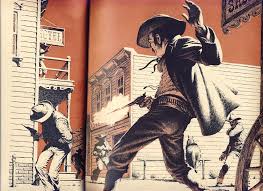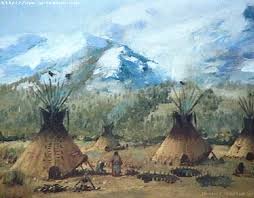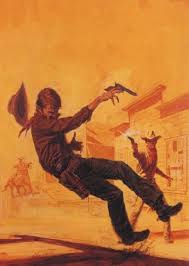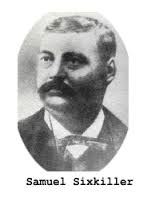1849 – A fire in St. Louis consumes 400 buildings and 27 steamships.
Trouble in Tahlequah
Enter to win a copy of the award winning book
Sam Sixkiller: Cherokee Frontier Lawman

Willis Pettit a tall, well-built black man sunk his spurs into his horse’s backend and the animal, already moving at a fast pace, quickened his stride. The anxious rider chanced a glance over his shoulder to see if he was being followed. In the landscape he left behind there was no sign of any other rider. A flash of relief passed over his face.
Sheriff Sam Sixkiller was in pursuit of Willis and had anticipated the route the fleeing criminal would take and was waiting for him at a ford in the Illinois River several miles outside of Tahlequah. The sheriff’s horse carried him over the rocks in the shallow section of water then dropped his head into the liquid and eagerly drank. Sam swung himself crossways in the saddle, lifted the canteen hanging off the horn, opened the container and took a long swig. He carefully scanned the scenery around him as he hopped off his horse and plunged his canteen into the water to refill it. The sound of a fast approaching horse made him pause for a moment. The sheriff returned the canteen to his saddle then lifted his rifle out of a holster. Turning slowly toward the sound, he leveled his gun in the direction of the oncoming steed.
Willis and his ride emerged from the thicket that flanked the river on both sides and followed the incline to the water’s edge. The horse spooked and reared back when it came up on Sheriff Sixkiller, and Willis was thrown in the process. Before he could get to his feet, he was staring down the barrel of the sheriff’s gun. He raised his hands in surrender, cursing his luck in the process.
On May 15, 1876, Sheriff Sixkiller arrested Willis Pettit for “assault with intent to kill Emanuel Spencer with a pistol.” It was the first of many arrests for Willis in the Cherokee Nation during Sam’s time in office. Willis, a former slave, aligned himself with other ex-slaves who believed they were entitled to land given to the Five Civilized Tribes. Their belief was based on the fact that slaves owned by the Cherokee, Chickasaw, Choctaw, Creeks, and Seminoles who were freed after the Civil War should be granted a part of the territory for their own exclusive use. Not every tribe agreed with the idea, and conflict sparked controversy, and at times, violence.
Use this form to enter to win a copy of Sam Sixkiller: Cherokee Frontier Lawman
To learn more about the life and times of Sam Sixkiller read
Sam Sixkiller: Cherokee Frontier Lawman
This Day…
Fame & Elwood P. Dowd

I took part in the Tucson Book Festival this past weekend and in many respects it was a sweet experience. I spent time with old friends and talked about writing, old western movies, and Seinfeld episodes. I met readers who were great fans of the western genre and were happy to share their thoughts about their favorite western authors from Dorothy Johnson to Johnny Boggs. I also met a few celebrated authors behaving badly. I was initially excited to make their acquaintance and found myself wanting to be within earshot of their tales about the books they’ve written and the literary giants they frequently come in contact. As the evening progressed and one insulting remark after another was made about the struggling western authors they’ve had the displeasure to be around or read I found myself less enamored of the big shots and more and more ashamed that I held them in high regard at all.
Why is it that I’m so quick with adulation for the banal, yet so begrudging with respect for the truly consequential? I should have been satisfied to spend an evening with those writers who had a true love of the Old West rather than a couple who had a true love for themselves and westerns were merely a footnote. Very poorly done, Chris, very poorly done.
You know, all I can figure that so many of us feel so anonymous, so powerless, and so insignificant that we howl and yelp at the mere hint of notoriety, like dogs watching the moon rise in the night sky. Hey, forget the guy who is setting at a booth all day peddling his western books to passersby and his wife who is working the register, when is that guy that’s been in numerous documentaries and has been working on the same western novel for six years going to get here?”
Will the doctor with the cure for cancer please sit the down, here comes the multi-award winning author who has penned yet another book about Wyatt Earp.
Look…in the penumbra between absolute obscurity and worldwide renown there exists a shadow region filled with a seething horde of pan flashers, dime store magicians and Holiday Inn cover bands hoping for a big slice of adulation quiche. And while most of us are content to rubberneck the carnage on the side of the road, too many people are desperately striving to actually be the car wreck, and I’m not sure we should feel compelled to recognize them. I know I’m going to work on that.
There’s a great line from the movie Harvey that played over and over again in my head this weekend. Elwood P. Dowd, Jimmy Stewart’s character in the film, explains his philosophy of life in the following way: “In this world, you must be oh so smart or oh so pleasant. Well, for years I was smart. I recommend pleasant.” Not only am I going to surround myself with writers who behave in such a manner I’m going to demand that behavior in myself.
This Day…
1878 – Frank Baker and Billy Morton were in the custody of a Regulator Posse led by Dick Brewer for their participation in the murder of John Tunstall. In an attempt to escape at Steel Springs, New Mexico, posseman William McCloskey was killed by Morton, but Morton and Baker were both quickly shot by the remaining posse members.
Principals of Peace
Enter to win a copy of the award winning book
Sam Sixkiller: Cherokee Frontier Lawman

The sweeping prairie lay quietly under the heat of a brassy sun as a lone wagon topped a grassy knoll that afforded an arresting view from every direction. Redbird Sixkiller drove the team of two horses pulling the vehicle toward the town of Tahlequah, Oklahoma Territory, in the near distance. His four-year-old son, Sam, sat beside him captivated by the sights and listening intently to the stories he told him about his ancestors and the origin of the Sixkiller family name. Redbird shared with Sam a tale about one of their fearless relatives. The ancestor was engaged in battle against the Creek Indians and had killed six braves and then himself before allowing another band of hostile Creek Indians that surrounded him to attack. The Cherokee Indian warriors who witnessed the daring act referred to the warrior as Sixkiller.1
Conversation between father and son died down as they rode into Tahlequah. Thousands of Cherokee Indians from the eastern and western portions of the state had descended upon the location to attend a convention that promised to unite the two factions. Since being removed from the Native homes, divided and sent to live at opposite ends of the territory, the Cherokee people were battling among themselves.2 The central theme of the convention was “one body politic under the style and title of the Cherokee Nation.”3 Redbird and Sam attended the ambitious meeting in September 1846 along with more than two thousand other Indians.4 Redbird wanted his son to see the efforts being made to resolve the violent conflict that had erupted between the groups. The factions did not agree on the concessions that should be made to the United States government over the land. The Cherokees in the east were opposed to leaving their homeland no matter what the government promised in exchange. Those in the west were in favor of the removal of the Cherokee to Oklahoma Territory, the funds and improved provisions that accompanied the move.5 Redbird was in favor of the Cherokee people coming together as one. He felt the prosperity and welfare of the Indian Nation and his family depended upon an undivided front.
Use this form to register to win!
To learn more about the life and times of Sam Sixkiller read
Sam Sixkiller: Cherokee Frontier Lawman
This Day…
A Killing in Tahlequah
Enter to win a copy of the award winning book
Sam Sixkiller: Cherokee Frontier Lawman

Although his exploits on the job were as courageous as Wild Bill Hickok or Wyatt Earp, the name of Sam Sixkiller is scarcely recognized today. The criminal class that invaded the Indian Nation in the region now known as Oklahoma from 1870 to 1886 had to contend with an Indian police force known as the Lighthorsemen, of which Sam Sixkiller was a member. His ability to fearlessly handle horse thieves, bootleggers, murderers, and rapists that perpetrated such illegal acts on Indian land earned him the respect of his people and fellow officers.
As High Sheriff in Tahlequah, the capitol of the Cherokee Nation, Sixkiller apprehended white lawbreakers selling rot-gut whiskey to Indians and squared off against hostile mixed-bloods like “Badman Dick Glass.” Glass had a reputation that rivaled Jesse James; some said he was even more ruthless. The sheriff wasn’t intimidated by the outlaw and did what was needed to bring him in. Sam Sixkiller not only arrested outlaws and placed them in jail, but also served as the warden of the very facility that housed the lawbreakers.
From Tahlequah, Sixkiller moved on to Muskogee, in present-day Oklahoma where he was promoted to Captain of the Lighthorsemen and helped to bring peace to the volatile area. When the railroads sliced through the landscape, Captain Sixkiller was named a special agent to the rail lines, thwarting attempted robberies and staying off whiskey peddlers hoping to transport their goods across the region. Isaac Parker, the famous 12th Judicial Circuit Judge that held court at Fort Smith, Arkansas from 1868 to 1898, was so impressed with Captain Sixkiller’s tenacity and dedication to law and order he recommended the officer be given a commission as a United States Deputy Marshal. These additional responsibilities further exposed the lawman to some of society’s most dangerous characters.
A legal altercation between Sixkiller and a pair of violent repeat offenders named Richard Vann and Alf Cunningham sparked a vendetta that led to the lawman’s death. Off duty and unarmed, Sixkiller was ambushed and killed by the criminals on Christmas Eve in 1886.
The death of Captain Sixkiller exposed a serious void in the federal law as it pertained to those who murdered Native American U.S. Deputy Marshals. There was nothing on the books that made it a federal offense to kill an Indian officer. Although legislation to correct this heinous oversight eventually passed, it came too late to affect the cowards that robbed Sixkiller of his life.
Sam Sixkiller died a martyr to the cause of law and order. His story is not only about his life and untimely demise, but also about the everyday life of a frontier lawman and the duties he performed, from the mundane to the perilous.
Use this form to enter to win.
To learn more about the life and times of Sam Sixkiller read
Sam Sixkiller: Cherokee Frontier Lawman
This Day…
Comes a Lighthorseman
Enter to win a copy of the award winning book
Sam Sixkiller: Cherokee Frontier Lawman

Lawman Sam Sixkiller led his horse through a belt of sparse timber along the Illinois River in Southeast Oklahoma. He was a stocky, dark-skinned, heavy-shouldered man with a neatly trimmed, droopy mustache, and small dark eyes that were flatly calculating.1 They shifted purposely from the streams of sunlight off a growth of blackberry bushes to the rocky path dancing before him. Apart from the sound of his roan’s hooves slowly moving through the sweet-gum shrubs and short grass, there was a mingling of a trio of agitated voices wafting through the warm air.2
Sam urged his ride into a clearing where three half-blooded Cherokee-Seminole Indians sat playing dice.3 In between rolls of the die the men drank from an amber-colored bottle they eagerly shared with each other. Scattered beside the men were four empty bottles of liquor. The drunken Indians barely noticed Sam slowly inching his horse into their crude camp.
The men were undisturbed by Sam’s presence and continued with their game. They argued over whose turn it was, nearly coming to blows over which player went next. Sam watched them toss the dice on a thick blanket. At first glance, the blanket appeared to be draped over a log. The closer he got to the action the more it became clear the make-shift table was actually the body of a fourth Indian. A stream of dried blood had trickled out from under the covering and pooled around a stand of butterfly weeds.
Sam scrutinized the scene more carefully and spotted a massive knife within reach of the Indian closest to him. Sam casually pushed his jacket over the six-shooter strapped on his side, revealing not only the weapon, but the slightly tarnished badge that showed he was a member of the Cherokee Nation police force. One by one the men turned and looked at the lawman. For a breathless instant Sam watched the knife, expecting one of the Indians to snap it up. Without saying a word the three got to their feet, wavering a bit as they did so. Sam pulled his gun out of his holster and leveled it at the men as he lifted his five feet eight inch frame off his horse. He motioned for the men to back away from the body, and they reluctantly complied. Disgusted, Sam walked over to one of the bottles and kicked it hard. It spun into a nearby rock and broke. What little booze was left inside it spilled out and quickly soaked into the dry land.
Sam made his way to the motionless man on the ground and, using the toe of his boot, rolled him out from under the blanket. The man was dead. There was a deep cut across his throat, and his limbs were stiff.
Use this form to enter to win!

